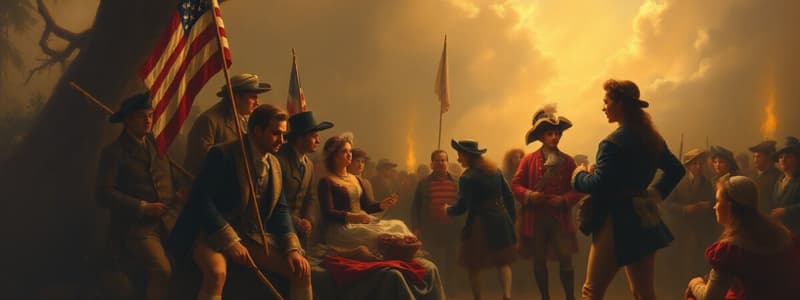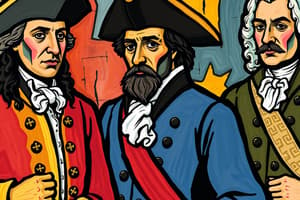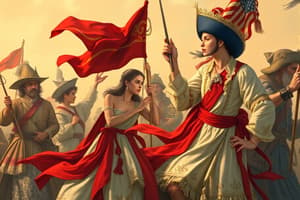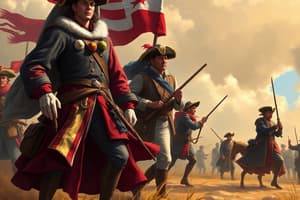Podcast
Questions and Answers
What term describes Americans who believed that the colonies should govern themselves?
What term describes Americans who believed that the colonies should govern themselves?
- Patriots (correct)
- Daughters of Liberty
- Tyrants
- Loyalists
Loyalists were Americans who wanted independence from Great Britain.
Loyalists were Americans who wanted independence from Great Britain.
False (B)
Who led the Sons of Liberty?
Who led the Sons of Liberty?
Sam Adams
To take back or cancel a law is known as to _____ a law.
To take back or cancel a law is known as to _____ a law.
Match the following terms with their definitions:
Match the following terms with their definitions:
What was the primary purpose of the Declaration of Independence?
What was the primary purpose of the Declaration of Independence?
The Declaration of Independence includes women as beneficiaries of its stated rights.
The Declaration of Independence includes women as beneficiaries of its stated rights.
Who wrote the Declaration of Independence?
Who wrote the Declaration of Independence?
The Declaration of Independence discusses __________ rights, which are inherent and cannot be taken away.
The Declaration of Independence discusses __________ rights, which are inherent and cannot be taken away.
Match the groups with their views on slavery related to the Declaration of Independence:
Match the groups with their views on slavery related to the Declaration of Independence:
What was one of the measures included in the Intolerable Acts?
What was one of the measures included in the Intolerable Acts?
The 1st Continental Congress resulted in a decision to support British policies.
The 1st Continental Congress resulted in a decision to support British policies.
What phrase describes the incident that started the Revolutionary War at Lexington and Concord?
What phrase describes the incident that started the Revolutionary War at Lexington and Concord?
The ____ Act enforced that British soldiers could be tried in Britain.
The ____ Act enforced that British soldiers could be tried in Britain.
Match the events to their descriptions:
Match the events to their descriptions:
What was the main purpose of the Olive Branch Petition?
What was the main purpose of the Olive Branch Petition?
King George III accepted the Olive Branch Petition.
King George III accepted the Olive Branch Petition.
Who wrote Common Sense, which spurred the colonists towards independence?
Who wrote Common Sense, which spurred the colonists towards independence?
The Olive Branch Petition was sent to King _________ III.
The Olive Branch Petition was sent to King _________ III.
Match the following events with their significance:
Match the following events with their significance:
What significant impact did the Battle of Saratoga have on the American Revolution?
What significant impact did the Battle of Saratoga have on the American Revolution?
The Battle of Cowpens was a decisive victory for the British forces.
The Battle of Cowpens was a decisive victory for the British forces.
Which battle involved Washington tricking Cornwallis by leaving fires burning?
Which battle involved Washington tricking Cornwallis by leaving fires burning?
The Battle of _____ led to the Americans winning control of the Ohio Valley.
The Battle of _____ led to the Americans winning control of the Ohio Valley.
Match the following battles with their significance:
Match the following battles with their significance:
Flashcards are hidden until you start studying
Study Notes
Patriots and Loyalists
- Patriots believed colonies should govern themselves.
- Loyalists remained loyal to Great Britain.
- Repeal: To cancel a law.
- Boycott: To refuse to buy certain goods.
Tyranny and the Sons and Daughters of Liberty
- Tyranny: Unjust use of government power.
- John Adams defended soldiers in the Boston Massacre, arguing self-defense.
- Sons of Liberty, led by Sam Adams, protested against British policies.
- Daughters of Liberty urged colonists to boycott British goods by making their own.
Intolerable Acts
- Closed the Port of Boston.
- Limited town meetings to one per year, requiring British permission.
- British soldiers were tried in Britain, not the colonies.
- Enforced the Quartering Act, requiring colonists to house British soldiers.
1st Continental Congress
- 12 of 13 colonies sent delegates to Philadelphia.
- Resulted in a boycott of all British goods and the formation of a militia.
Lexington and Concord
- Colonial militia at Lexington encountered British troops.
- A shot, known as "the shot heard 'round the world," marked the start of the Revolutionary War
Declaration of Independence
- Author: Thomas Jefferson.
- Purpose: To convince the Continental Congress to declare independence from Britain.
Parts of the Declaration of Independence
- Natural Rights: Rights inherent to all people, including life, liberty, and the pursuit of happiness.
- King's Wrongdoings: Outlines the King's abuses of power.
- Independence and Right to be Free: Declaration of independence and the right to self-governance.
Groups Omitted from the Declaration of Independence
- Women
- People of color
Debate over Slavery
- Southerners feared it might lead to demands for slave emancipation.
- Northerners worried it could offend merchants profiting from the slave trade.
- Delegates felt it was unfair to blame the King for enslaving Africans.
Olive Branch Petition
- Sent by the colonists to King George III as a peace offering.
- King George rejected it, pushing the colonists towards independence.
- Thomas Paine’s Common Sense encouraged independence.
American Revolution Battles
Battle of Trenton (December 26, 1777)
- Location: New Jersey.
- Result: American victory, Washington surprised and defeated the British.
- Significance: Restored American morale and provided hope for victory.
Battle of Princeton (January 1777)
- Location: New Jersey.
- Result: American victory, Washington used a tactic of burning fires to deceive the British.
- Significance: Restored American morale and provided hope for victory.
Battles of Brandywine and Germantown (July 1777)
- Location: Philadelphia, Pennsylvania.
- Result: British victories.
- Significance: Brought the British closer to their goal of cutting off New England colonies.
Battle of Saratoga (1777)
- Location: New York.
- Result: American victory, with French support.
- Significance: Turning point in the war, leading to French alliance with the Americans.
Ohio Valley Battles (1778)
- Location: Ohio Valley.
- Result: American victories.
- Significance: Gained control of the Ohio Valley for the Americans by expelling British forces.
Battle of Cowpens (January 1781)
- Location: South Carolina.
- Result: American victory under Daniel Morgan against the British.
- Significance: Weakened British control in the South.
Battle of Yorktown (October 17, 1781)
- Location: Virginia.
- Result: American and French victory.
- Significance: The French navy blockaded the Chesapeake Bay, trapping the British and leading to their surrender. This effectively ended the Revolutionary War.
Additional Notes
- Loyalists lost their land.
- Treaty of Paris established the borders of the newly independent nation:
- North to Canada.
- West to the Mississippi River.
- South to Florida.
Studying That Suits You
Use AI to generate personalized quizzes and flashcards to suit your learning preferences.




